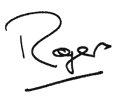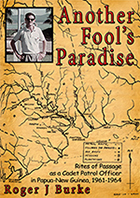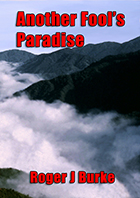READ ALL ABOUT IT!

NOW RELEASED
... after years in production!
For all readers of English literary fiction!
Get it at Google Play t'day ... cost of a black coffee, is all.
NOVEL WORDS
... on the loose!
Catch it at The App Store also.
Why Would Anybody Spend Eighteen Plus Years - To Date - Reading Dictionaries?
Find Out With Roger's Reference!
To give you some background into the development of Roger’s Reference may I tell you a story?
I remember, long ago, I read a short story called “Mayhem in The Classroom”. Actually, the title was "Meihem In Ce Klasrum" and it was written by Dolton Edwards, in 1946. I only found that out recently (January 2005) when Al Thomas sent me an email and a link, all about it. Thanks again, Al!
But, what a funny piece it was!
When first published in 1946, I was at school and read it with much mirth - even falling off my chair, I laughed so much. You see, the author started to change certain letters in words - while he wrote - some at the start of a word, others in the middle, and some at the end - all according to some rules he devised about phonetic spelling.
By the time I got to the end, it was very hard to make any sense of it at all - even though it was still "English".
Perhaps you recall reading it yourself? If you haven't read it, or would like to re-read it, here's a link www.angelfire.com/va3/timshenk/codes/meihem.html (a new page will open). You won't be disappointed ... and, if you read it, you'll understand why it has such a quirky title.
I thought about that, over the years, and how the words of the story were constructed; it was a very powerful lesson for me....
Now, over fifty years later, would it be possible, I wondered, to do it differently and still make sense?
What about a short story which substitutes a word for another which sounds the same, but spelt differently, hmmm? That is, write a piece using the homophones for all the words in it, instead of the actual words, wherever possible....
Dew ewe no watt eye mien?
Take the whirred ‘sense’, four example. Watt cents wood yew get from the sentence, if ‘sense’ was changed to ‘scents’, oar ‘cents’ fore that matter, as yew sea at the start of this. It is hard two reed, write? Butt, at least the sound is sound; that is, yew here it as yew ought two. Butt, somehow, it’s knot all their, wright? However, eye feel the knead two rite this down, inn order two make yew understand watt aye’m trying too say. That is, eye hope yew get the drift of my scents! Who nose, yew mite say? Eye no my knows nose, anyway, sew their!
Ouch ... that
was
a bit difficult to follow, hmmm? (Whew, THIS is easier to read, right?)
Well, I decided NOT to write a story (sighs of relief all round!), but as you’ve guessed by now,
I am fascinated at the way the sound of a word, in one context, can mean something entirely different in another, different context.
The paragraph above was perhaps a bit strange - and I hope amusing - to read, right? Phonetically, however, the sentences are understandable;
only the spelling has upset the apple cart, so to speak.
Over the years,
I wondered more and more about these common, and not so common, words we all use: just how many are there, in fact?
How many words are there, that sound the same, but which have different meanings? Are they spelt the same or are they different?
I had to know!
Before I could do that, however, I had to figure out exactly what I was looking for. Eventually, I decided that I should look for all the words that conform to these rules:
-
1. They MUST sound exactly the same (i.e. the pronunciation, as shown in the dictionary, must be the same);
2. They MUST convey entirely different meanings; and
3. They MUST be in a dictionary.
I decided to exclude proper nouns (too specialized) and combination words such as “where’s” or “you’re” etc (too confusing, although such a reference list is now available, as you will discover).
I wanted ONLY single words, of any type, and of one or more syllables.
Hence, by definition, that would include nouns, verbs, adverbs, adjectives, participles, pronouns, gerunds, articles, prepositions and conjunctions - together with all relevant
plurals
(if I’ve overlooked any classification, it’s nevertheless included). That decided, I took out my trusty Oxford,
and began to read.
When I finished, I had a database so large that I was amazed, astounded, almost at loss for words.(Ooops!) The total number of individual words I had compiled was over 5000!
And, growing almost daily! What was even more mind-numbing for me was that
a large portion had three, or more, entirely different meanings.
Moreover, along the way, I discovered that there was a dearth of reference books about homonyms and homophones.
Those we found, on the Web, were small (in number of words) in comparison, and contained too many inconsistencies. So, my wife Sherry, and I figured that there was an opportunity to develop and market a comprehensive and professional reference book.
So ... we did!

The result of our endeavors is available now, and
you can order your copy by clicking here.
Thanks for reading.

Roger Burke
DRUM
You know the usual meaning(s) - now rest your mouse on it to find out another, not so common, meaning!
Dreams of adventure become reality when, in 1961, nineteen-year-old Roger Burke gets a job in New Guinea as a Cadet Patrol Officer.
So ... come with Roger as he tackles the clash of cultures; the harshness and humor of colonial administration; patrolling in country; earthquakes, tropical diseases and other nasties; investigating murders and suicides; and just missing death by a spear in the gut....
Read a free sample from the ebook and order a full copy here for only $2.99.
February 1st, 2015
Happily, I can now announce the perfect bound, paperback edition of Another Fool's Paradise is now for sale at Amazon.com, Amazon.co.uk and CreateSpace.com:Complete with forty plus photos of places visited and patrolled during my time in New Britain, you can order a copy - at $14.99 - by clicking the above image.
AD HOC....
2022Coming Soon To This Space: Art Australia Online
Twitter: @mayapan1942
Here's the novel app about challenging words used in English literary fiction:

...for all students and readers of English literary fiction.
Get it at Google Play now! And, also now at The App Store.




